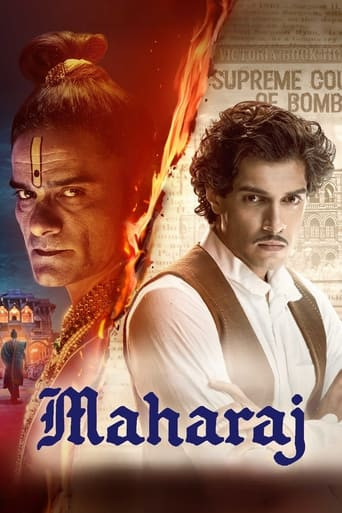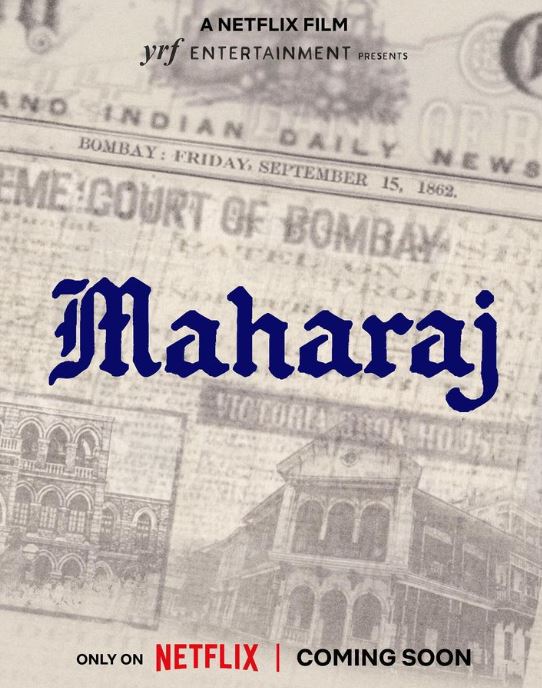“Maharaj (2024): A Divisive Historical Drama with a Modern Lens
Introduction
We’re thrilled to take a closer look at the fascinating topic of Maharaj (2024): A Divisive Historical Drama with a Modern Lens. Come along as we weave together insightful information and offer fresh perspectives for our readers.
Maharaj (2024): A Divisive Historical Drama with a Modern Lens

"Maharaj," a 2024 period drama that premiered on Netflix, has quickly become a talking point, not just for its cinematic qualities but also for the controversy surrounding its subject matter. Directed by Siddharth P. Malhotra, the film plunges viewers into the heart of 19th-century India, a time of immense social and religious upheaval. While the film boasts strong performances and a visually compelling presentation, it’s the narrative’s exploration of religious beliefs and societal norms that has sparked both acclaim and criticism.
Synopsis and Historical Context
The film is based on the 1862 Maharaj Libel Case, a landmark legal battle that challenged the authority of a prominent religious leader within the Vaishnavite Pushtimarg sect. Set in colonial India, the story revolves around Karsandas Mulji, a social reformer and journalist who fearlessly exposes alleged immoral practices within the sect. The central figure accused is Jadunathji Brijratanji Maharaj, a highly revered religious figure.
Karsandas’s accusations, published in a local newspaper, ignite a firestorm. He alleges that the Maharaj engaged in inappropriate relationships with female devotees, exploiting their faith and devotion for personal gain. The Maharaj, backed by his powerful followers and the weight of tradition, sues Karsandas for libel, claiming that the accusations are false and defamatory.
The ensuing court case becomes a battleground for competing ideologies. On one side, there’s Karsandas, representing the burgeoning spirit of social reform and challenging the established order. On the other side, there’s the Maharaj, embodying the traditional authority of religious institutions and the deeply ingrained beliefs of his followers.
A Star-Studded Cast and Compelling Performances
One of the film’s strongest assets is its cast. Junaid Khan, making his debut, delivers a nuanced and compelling performance as Karsandas Mulji. He portrays the character’s idealism, courage, and vulnerability with remarkable skill, capturing the essence of a man driven by a strong moral compass.
Jaideep Ahlawat shines as Jadunathji Brijratanji Maharaj. He avoids simplistic villainization, instead portraying the Maharaj as a complex figure, deeply entrenched in his beliefs and convinced of his own righteousness. Ahlawat masterfully conveys the Maharaj’s charisma, authority, and the weight of tradition that he carries.
Shalini Pandey provides a strong supporting performance as Kishori, a woman caught in the crossfire of the controversy. Her character represents the plight of many women in that era, who were often subject to the whims of societal norms and religious authority.
The supporting cast, including seasoned actors like Sharvari Wagh, adds depth and authenticity to the film’s portrayal of 19th-century Indian society.

Direction, Cinematography, and Production Design
Siddharth P. Malhotra’s direction is commendable, effectively recreating the atmosphere of 19th-century India. The film’s pacing is well-managed, allowing the narrative to unfold at a measured pace, building tension and suspense as the court case progresses.
The cinematography is visually stunning, capturing the grandeur of the era while also highlighting the stark realities of social inequality. The use of light and shadow creates a sense of drama and intrigue, enhancing the emotional impact of the story.
The production design is meticulously detailed, transporting viewers to the bustling streets of Bombay and the opulent interiors of the Maharaj’s residence. The costumes, set design, and overall visual aesthetic contribute to the film’s authenticity and immersive quality.
Themes and Social Commentary

"Maharaj" delves into several important themes that remain relevant today. The film explores the tension between tradition and modernity, the power of religious institutions, and the importance of social reform.
One of the central themes is the challenge to religious authority. The film questions the unquestioning acceptance of religious dogma and the potential for abuse of power within religious institutions. It highlights the importance of critical thinking and the need to hold those in positions of authority accountable.
Another important theme is the fight for social justice. Karsandas Mulji’s struggle against the Maharaj represents a broader fight for equality and justice in a society deeply divided by caste, class, and gender. The film underscores the importance of speaking out against injustice, even in the face of overwhelming opposition.
The film also touches upon the theme of women’s rights. Kishori’s character serves as a reminder of the vulnerability of women in that era and the need to protect their rights and dignity.
Controversies and Criticisms

"Maharaj" has faced significant controversy since its release. Some religious groups have objected to the film’s portrayal of the Vaishnavite Pushtimarg sect, claiming that it is biased and inaccurate. They argue that the film unfairly demonizes the Maharaj and misrepresents the beliefs and practices of the sect.
These criticisms have led to calls for the film to be banned or censored. However, supporters of the film argue that it is a work of fiction inspired by historical events and that it raises important questions about religious authority and social justice.
The controversy surrounding "Maharaj" highlights the sensitivity of religious issues and the challenges of portraying historical events in a way that is both accurate and respectful.
Strengths and Weaknesses
Strengths:
- Compelling Performances: Junaid Khan and Jaideep Ahlawat deliver outstanding performances, bringing depth and nuance to their characters.
- Visually Stunning: The cinematography and production design are top-notch, creating a visually immersive experience.
- Thought-Provoking Themes: The film explores important themes related to religious authority, social justice, and women’s rights.
- Well-Paced Narrative: The film’s pacing is well-managed, building tension and suspense as the story unfolds.
Weaknesses:
- Controversial Subject Matter: The film’s portrayal of religious beliefs has sparked controversy and criticism.
- Potential for Bias: Some viewers may perceive the film as biased against the Vaishnavite Pushtimarg sect.
- Historical Accuracy: The film takes liberties with historical events, which may be problematic for some viewers.
- One-Sided Perspective: The movie is told primarily through the eyes of Karsandas, presenting a biased point of view.
Overall Impression
"Maharaj" is a thought-provoking and visually compelling historical drama that tackles sensitive and controversial issues. While the film has its flaws and has faced criticism for its portrayal of religious beliefs, it is ultimately a worthwhile watch for those interested in exploring themes of social justice, religious authority, and the fight for equality.
The film’s strengths lie in its strong performances, stunning visuals, and well-paced narrative. However, viewers should be aware of the potential for bias and the film’s liberties with historical events.
"Maharaj" is not a film that shies away from difficult questions. It challenges viewers to think critically about the role of religion in society and the importance of upholding justice and equality. Whether you agree with its portrayal of events or not, the film is sure to spark conversation and debate.
Rating:
I would give "Maharaj" a rating of 3.5 out of 5 stars. It’s a well-made film with strong performances and important themes, but its controversial subject matter and potential for bias may detract from the viewing experience for some.
Target Audience:
The film is likely to appeal to viewers interested in historical dramas, social justice issues, and films that challenge the status quo. However, viewers who are sensitive to religious issues or who prefer films that adhere strictly to historical accuracy may find the film problematic.
Final Thoughts
"Maharaj" is a film that is sure to generate discussion and debate. It is a reminder of the power of cinema to challenge our beliefs and provoke us to think critically about the world around us. Whether you love it or hate it, "Maharaj" is a film that is sure to leave a lasting impression.